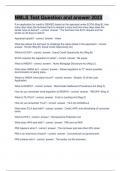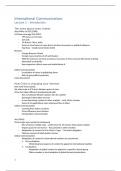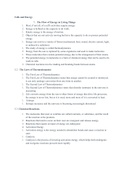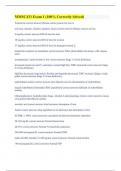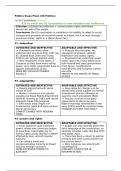Summary CPP
CONTEMPORARY POLITICAL PHILOSOPHY
, Literature Summary CPP
Contents
Introduction.................................................................................................................................2
Book introduction chapter (Swift book)..................................................................................2
Social Justice...............................................................................................................................3
Book part 1: Social Justice......................................................................................................3
Liberty.......................................................................................................................................10
Chapter 3: Liberty.................................................................................................................10
Equality.....................................................................................................................................17
Chapter 4: Equality...............................................................................................................17
Community...............................................................................................................................23
Book chapter 4: Community.................................................................................................23
Democracy................................................................................................................................28
Book chapter 5: Democracy..................................................................................................28
Introduction Fabre.....................................................................................................................35
Future Generations....................................................................................................................40
Chapter: Justice towards Future Generations........................................................................40
Multiculturalism........................................................................................................................48
Chapter 3 Fabre book: Multiculturalism...............................................................................48
National Self-Determination.....................................................................................................55
Book chapter 4: National Self-Determination......................................................................55
Global Distributive Justice........................................................................................................62
Chapter 5: Global Distributive Justice..................................................................................62
Immigration...............................................................................................................................68
Chapter 6: Immigration.........................................................................................................68
1
, Literature Summary CPP
Introduction
Book introduction chapter (Swift book)
Political philosophy provides the tools that politicians require to work out
what they really think about values and principles
First step: Conceptual analysis (working out what people mean when they
say things)
Analytical philosophy bases itself on the fact that there is a 'truth'
(postmodernist philosophers strongly disagree)
What does someone believe, how were their arguments, is what
they believed true and their arguments valid?
'the political' is concerned specifically with the state
Political philosophy
o How should the state act?
o What moral principles should govern the way it treats its
citizens?
o What kind of social order should it create?
o Etc…
So…it is moral philosophy, interested in justification (what the state
ought/ought not do)
The state = the collective agent of citizens
5 concepts this book looks at:
1. Social justice
2. Liberty
3. Equality
4. Community
5. Democracy
But political philosophy is not directly for policy making etc.
Criticisms to 'ideal theory'
e.g. Rawls' theory on equality is under attack for being utopian and
irrelevant (ideal theory)
o Utopian = it does not resemble the real world and can
therefore not happen
o Irrelevant = it could happen but isn't realistic (e.g. elite private
schools are not good because it leads to inequality of opportunity,
but people won't stop that fact from going)
-> some argue that we need more non-ideal theory
o Theory that helps us think about what to do in our actual
circumstances (more policy-oriented)
2
, Literature Summary CPP
Social Justice
Book part 1: Social Justice
A theory of Justice - John Rawls (1971)
This book revived the discipline of political philosophy
About liberty, equality and community
Rawls "justice is the first virtue of social institutions"
Justice is a constraint on what we can do, it's our first priority when
deciding the rules we are going to live under.
Concept = general structure of a term
Conception = particular specification of that 'concept'
(3 influential conceptions:)
1. Justice as fairness (Rawls)
2. Justice as entitlement (Nozick)
3. Justice as desert
Justice = about giving people what is due to them, and not giving them
what is not due to them
About duty: what morality compels us to do
Justice and morality are not the same. We can act morally (donating to
charity) without thinking it is our duty to do so (justice). Justice is a subset
of morality
Justice is significant, it gives a common and plausible view of what the
state can and cannot make people do
Once we know our duties to one another then we can also know
when we can justify using the state to get people to do things
(political morality)
o Coercively enforceable duties -> very important to identify
scope/limits of justice
e.g. murder is sometime we all agree on, but charity not
(depends on conception)
There is an incentive by politicians to confuse political concepts
e.g. democracy has positive connotations especially in politics but is
not necessarily always a good thing.
o 2 societies (which one is better?)
1 democratic (everyone gets to vote on the religion in
the state)
2: constitution protects religious freedom
3



